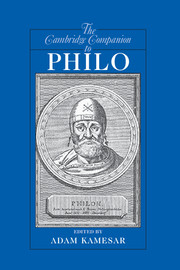1 - Philo, His Family, and His Times
from Part 1 - Philo’s Life and Writings
Published online by Cambridge University Press: 28 November 2009
Summary
As might be thought appropriate for a philosopher who frequently expressed disdain for life in this world and its fleeting events, relatively little is known of Philo's life. Philo tells us little about himself, and unfortunately, there is not much else in the dossier of ancient sources about him. Josephus gives him a few lines in his Jewish Antiquities (18.259-60), but beyond stating that he was highly respected, a philosopher, and led an Alexandrian Jewish delegation to the Roman emperor Gaius Caligula, they hardly tell us anything we could not learn or infer from Philo's own writings. The bits of information about Philo offered sporadically in early patristic literature beginning with Eusebius and Jerome (the latter of whom devoted, in his biographical compendium De viris illustribus, a brief entry to Philo [ch. 11]), add little, apart from Christian myth, to what we can learn - as they did - from Philo and Josephus. However, if we move out from the inner circle, that is, about Philo himself, which we shall address in section I, we find a good bit of information about the next two circles: his family and the historical context within which he lived. Both are relatively well-documented and of import for any proper understanding of Philo. Above we enumerated the data Josephus supplies and underlined how little they actually are; now we may add that Josephus gives one more datum, unparalleled elsewhere, that is a treasure: Josephus gives us the name of Philo's brother.
- Type
- Chapter
- Information
- The Cambridge Companion to Philo , pp. 9 - 31Publisher: Cambridge University PressPrint publication year: 2009
- 9
- Cited by



